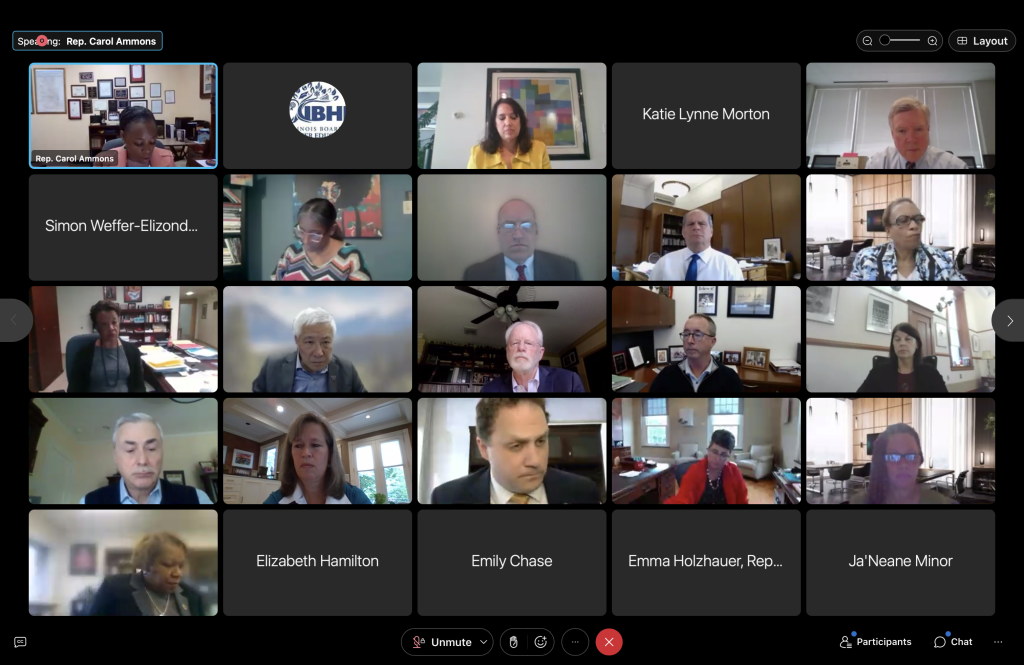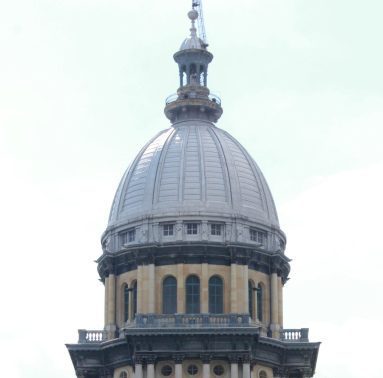
During the May 25 virtual convening of the Commission on Equitable Public University Funding, members continued to discuss matters pertaining to creating an equitable funding model in Illinois. Commissioners discussed next steps for convening workgroups, and as part of the Commission’s continuing research into existing state models for equitably funding their public universities, the group heard a presentation on Tennessee’s approach to funding its institutions. Finally, the Commission began to learn more about the research base for a student centered adequacy model.
Tennessee Presentation
As part of the Commission’s ongoing efforts to research and learn about funding systems and models implemented in other states, Commissioners heard from Steven Gentile, Chief Policy Officer at the Tennessee Higher Education Commission. Gentile spoke with the group about his state’s funding model that was implemented in 2010 through the Complete College Tennessee Act that most notably shifted the state’s focus from enrollment-based funding to an outcomes-based model that is reviewed every five years. Under its current funding model, the state considers three “focus populations:” Adult Students, Low-Income Students, and Academically Underprepared Students. Tennessee does not differentiate when it comes to race or ethnicity in their metrics and uses a weighted formula based on how many students in the focus populations make progress toward and earn their degree at an institution.
Commissioners followed Gentile’s presentation with questions—among them, from Commissioner and Chairman of the Illinois Board of Higher Education John Atkinson, who asked for the reasoning behind the specified focus populations. Gentile explained that the state felt this was the surest way to reach students from various backgrounds with the “academically underprepared” population focus aimed at ensuring institutions weren’t disincentivized from accepting students with low ACT scores. Commissioner Robin Steans, who is President of Advance Illinois, asked about whether the state had considered explicitly calling out race in the model. Gentile explained that the agency decided to focus on students from low-income households across all races.
Other Presentations
In addition to the presentation from Tennessee, Commissioners also heard more about the national higher education funding landscape and implications for Illinois. Martha Synder of HCM Strategists shared that as the state works towards this new funding model, it is important to note that any model should not be static—Commissioners will need to continue to review, evaluate and adjust to any unforeseen consequences and align more closely with state needs.
Nate Johnson from Postsecondary Analytics discussed the research base for defining “adequate” funding for public universities in Illinois, outlining some of the opportunities and challenges that will come with defining adequacy in higher education. He drew a connection between funding and outcomes, and the promise of proactive rather than reactive measures to improve student outcomes, using the CUNY ASAP program as a proven example of this kind of investment.
Three Workgroups and Jamboard Activity
Following the three presentations, Commissioners then discussed the creation of the three workgroups that will meet throughout the summer to dive into Adequacy, Resources, and Technical Modeling. Roughly 10-12 Commissioners will comprise each of these groups that won’t make decisions, but will provide added, focused capacity to the Commission to elevate and understand funding components and considerations. The Adequacy and Resources work groups will meet once a month moving forward to continue on this work prior to the next full Commission meeting in September.
Additionally, Commissioners participated in an interactive Google Jamboard Activity designed to get more perspectives from Commissioners as they work toward answering critical questions informing the work ahead including:
- “What components or elements should be included when developing an adequate funding structure for public universities?”
- “Other than state funding, what types of resources should be considered when addressing institutional adequacy and ability to equitably serve students?”
Public Comment
Towards the end of the meeting, Commissioners also heard public comment from Maurine Magilocco, a former professor at Western Illinois University and current member of the Faith Coalition for the Common Good, as well as Jocelyn Bravo, an Outreach Specialist for Young Invincibles and recent graduate of the University of Illinois at Chicago.
Magilocco spoke to the need to ensure university buildings are well-maintained to support student learning and the need for adequate funding for advising and counseling services. Magliocco added that students of color should have access to counselors and university faculty who look like them and can better assist their needs and backgrounds.
Bravo emphasized the need to make sure that the new funding model prioritizes students from underrepresented backgrounds so that everyone can have the opportunity to thrive while attending college in Illinois.
Next Steps
While the next Commission meeting is scheduled for September 1, the Adequacy and Resources workgroups will be meeting throughout the summer. These meetings are open to the public. The groups will report on their work at the next meeting as well as hear from a student panel, other states, and university presidents.
About this Blog Series
Established in 2021 by SB815, the Commission on Equitable Public University Funding charged with researching, modeling, and ultimately recommending specific criteria and approaches for an equity-based higher education funding model for Illinois’ public universities. Click here to Learn more about the passage of SB815 and creation of the Commission.
In an effort to raise awareness about these public meetings and their progress, the Coalition for Transforming Higher Education Funding will share meeting recaps as soon as possible following each of the Commission’s remaining meetings.
For more information about the Coalition, email Sonianne Lozada, Community Engagement Manager, at slozada@partnershipfcc.org.

As the Commission works toward its July 2023 deadline for recommending an equity-centered funding model for Illinois’ public universities, community members coming to the table to elevate the need for an adequate, equitable, and stable funding model is crucial.
Please join the next commission meeting on September 1 for the opportunity to share why this issue is so important to you. In the meantime, you can share this tweet and discuss why you believe higher education matters in Illinois on social media.

